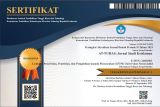Gerakan Fajar Nusantara (GAFATAR) dan Agama Semitik: Antara Toleransi Agama dan Sinkretisme Agama
(1) * Muhammad Wahyudi
 (UIN Sunan Kalijaga Yogyakarta)
(UIN Sunan Kalijaga Yogyakarta) Indonesia
(*) Corresponding Author
AbstractAfter the fall of Orde Baru, various religious sects emerged as if they were endless. Not only radical groups but also conservative groups and even splinter groups. These schools are present by offering solutions to various problems faced by society, from the economy to spiritual needs. Al-Qiyadah Al-Islamiyah, which was founded by Ahmad Mushaddeq, for example, is present in a society that is thirsty for spiritual needs. Gerakan Fajar Nusantara (Gafatar), which is a metamorphosis of the Millah Abraham (Komar) Community, is here to offer solutions to the problems of conflict between religious adherents that seem never to be finished in Indonesia. This New Religious Movement offers a new concept regarding the relations between Semitic religions. This movement considers that the differences between Semitic religions (Judaism, Christianity, and Islam) are only biological, not theological. This view is the concept of hyper-tolerance, which is the tolerance that crosses the boundaries that differentiate the respective Semitic religions. This view is one of the reasons for the Indonesian Ulema Council (MUI) to issue a heretical fatwa against Gafatar. The concept of tolerance that is relevant to building harmony between religious communities in Indonesia is the Agree in Disagreement offered by A. Mukti Ali, which is to believe that religion is the best religion without needing to blame other religions. This concept is in line with the values contained in Surah Al-Kafirun, namely allowing other parties to carry out their rituals of worship without the need to be confused with different religious teachings. Keywords: New Religious Movement, Gerakan Fajar Nusantara, Agree in Disagreement. |
Full Text: PDF
Refbacks
- There are currently no refbacks.
Copyright (c) 2020 Muhammad Wahyudi
This journal is licensed under a
Creative Commons Attribution-ShareAlike 4.0 International License





.png)






